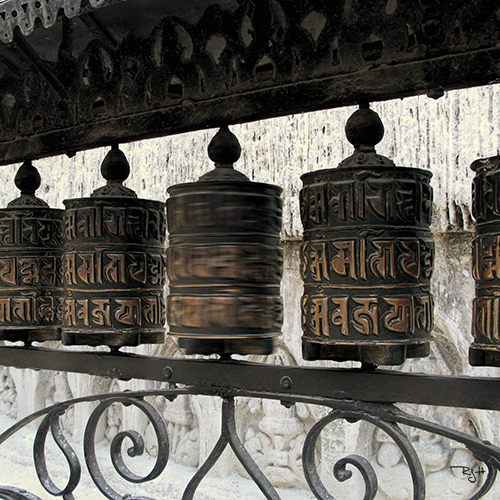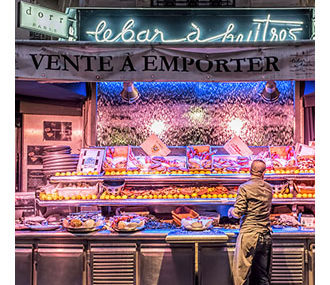* This is a guest post done by my sister Kayte Ware.
About six years ago I signed up for a weekend retreat at the temple I normally attend for mediation. I am a big believer in meditation and its benefits, and this retreat was about mindfulness.
I have spent a lot of time at this temple in the past – going for hour long mediation and chanting with the llamas. So I was curious about mindful meditation. What was it? How would it work? Isn’t mindful and meditation the same thing? How could you have anything but a mindful meditation?
So many questions!
The first task we were given was to put a raisin in our mouth.
Now I am not a big fan of raisins (to me grapes should only be allowed to turn into wine!) but figured they knew what they were doing, so I went along with task. Raisen in mouth.
The Buddhist llama told us to roll that raisin around in our mouth. He asked, “What did it feel like?” And then, “What did it tasted like?”
I had never thought about a raisin so much before in my life.
The whole assignment took about 5 minutes (though it felt longer). When we were done I realized that all my thoughts were on that raisin and nothing else. For five full minutes, all I had thought about was how a raisin felt and tasted.
Compare that to what you normally think about in a five-minute block. What will I wear? What will I eat? What is in the news? What is next on my schedule? Why did that lady talk to me like that in the grocery store?
I’m not suggesting that to be more aware of things you have to suck on a raisin for 5 minutes (though I would fully recommend it!).
The definition of mindfulness is “a mental state achieved by focusing one’s awareness on the present moment, while calmly acknowledging and accepting one’s feelings, thoughts and bodily sensations. Used as a therapeutic technique.”
Simple mindfulness can be achieved by going outside on a clear and dark night and looking at the stars and moon. Or waking up early and drinking some tea watching the brilliant colors of the sunrise. Or walking barefoot through the dew soaked grass (on a warm day of course. I wouldn’t recommend this in the Northeast in the winter).
There are so many ways you can become aware. To slow down. To focus.
Mindfulness is not just for our own personal benefit. Our mindfulness can also benefit those around us as well. Take the world we are living in today. There is so much hate, anger and uncertainty. There are people who are scared to leave their houses who have become more and more isolated. Or people unsure if they are going to get their jobs back or where their next meal will come from. The world’s situation has become a mental health crisis.
There is a quote saying “If you live in the past you are depressed. If you are scared about the future, you become anxious. But if you are at peace you are living in the present”-Lao Tzu.
And that is where mindfulness mediation comes in – staying in the present. Mindfulness mediation is not going to heal everyone, but it might help with healing you and how you relate to others.
Unfortunately, many people say or think “meditation is too hard”, “I can’t seem to stop ruminating”. You don’t need to have your legs crossed in the lotus position for two hours (unless you really want too). Meditation can be much simpler.
When you are putting gas in your car on a cold day just imagine you are on a hot beach with the sun on you and the ocean waves crashing.
Put an ice cube in your mouth when you are angry or anxious. Concentrate on the feeling of the coldness.
When you are angry or stressed just stop moving for a minute and feel the earth below you, put your hand on your belly and take a deep breath. Expand the breath work to make it longer. Imagine you are inflating a balloon.
One of my favorite methods of meditation is walking. You can access a variety of these on YouTube. Just lace up your sneakers, put your headphones in and take a walk. The guided mindfulness mediation will have you concentrate on things like the breeze or your feet walking. It makes you more aware on what is going on around you.
And when you are angry you could always try a “f**k it’ meditation. While you are breathing in you say “f**k” and on your exhale say “it” in your mind. I guarantee you will smile, and your anger will dissipate. Anger is not an emotion we want to have. As Buddha says, “Holding onto anger is like grasping a hot coal with the intent of throwing it at someone else; you get burned.”
So how can you use mindfulness in your daily life? In the workplace! You can easily become anxious or depressed with the economy right now. Worried that you might not have a job. There are escalating levels of expectation, loss of direction, too much to do so little time, and lack of sleep. So you need to ask yourself “what is the quality of my mind at work”. “Am I living up to my own expectations?”
Through mindfulness we can train our minds to work in a more productive way. This won’t just give us relief from stress, it can actually change how we work.
Sounds good, right? But how???
Keep an open mind. Most of our suffering stems from our deep views, opinions and ideals of how things should go or how people should be. When someone doesn’t act a certain way, we suffer. This idea even holds true with politics nowadays. Have you felt more riled up and upset when people don’t have the same beliefs as you (this a great time for the “f**k it” mediation)?
And just when we think it is hard to be open-minded toward others, how about trying to be open-minded toward ourselves? To let ourselves ‘off the hook’ for not doing everything right, for not being who we think we should be to everyone. We beat ourselves up A LOT! How do we address this?
One way I have found works is, if you are feeling distressed at work, recognize those feelings. Notice the physical sensations of your body. Do you clench your hands or furrow your brow? Does your body tense up and your stomach start to hurt? What triggers do you notice about yourself when you are distressed?
Notice them (this requires you to be mindful!). Then make the conscious action to be in control of your body, thoughts and emotions instead of them being in control of you. Take a breath. Stop for a moment. Take your control back.
The more you understand your own mind the more you can understand the minds of others. Mindfulness doesn’t give you a crystal ball but it does tend to increase your empathy and to put yourself in someone else’s shoes. You can actually transform that feeling of “Oh man…here comes my supervisor. I bet he wants to change my work again” into “Here comes Bill. How can I see or hear him without judgement as though we are interacting for the first time.”
For mindfulness to help you at work you need to practice formal and informal mindfulness practices to bring it to life. Formal practice involves employing mindfulness mediation on a regular schedule. Just like strength training, you are building a muscle and need to exercise that mindfulness muscle consistently for it to develop.
Informal practice can be taken at any time of day. It involves nothing more than focusing the mind on whatever is happening at that present moment.
Remember the raisin? Other than teaching mindfulness, the raisin reminded me that mindful eating is also important, especially for people with stomach issues. In this busy world we live in it is very hard sometimes to sit and eat for any length of time. Although I guess one benefit to the quarantine has been learning new recipes!
Quarantine has also given us the time to actually sit down and enjoy our food instead of eating while driving. Or not eating at all until you scarf down on a big meal when you have the chance. Mindful eating is slowing down and stopping before we are full. Eating when our bodies tell us too (hello growling stomach or hanger!).
Many times, we eat out of stress, boredom, loneliness or sadness (emotional eating). This is when you should show your body some self-compassion. Take a nice hot shower or bath. Light some candles and close your eyes – being mindful of where you are and the feeling you have. Listen to some music.
And eat foods that are nutritionally healthy. Going back to my raisin story, I didn’t find the raisin all that appealing but it did help me slow down and recognize what I was eating (and that I would have preferred to be eating something else).
Mindfulness can be used in so many facets of your life. From stress to anger to hunger. In the workplace, at home, or when you are pain. Find the right balance. What works best for you. But find something!
As Pema Chodron says ‘Mediation practice isn’t about trying to throw ourselves away and becoming something better. It’s about befriending who we are already.’









